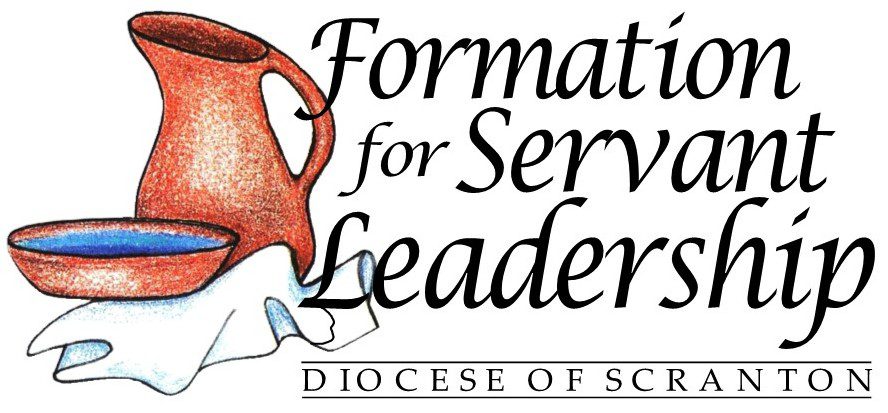
“Discipleship is the fundamental vocation in which the Church’s mission and ministry find full meaning.
This call is, first of all, a gift. Holiness is nothing other than the gift of loving union with God and the sharing of this love in right relationship with others.
This gift, in turn, becomes a mission that must shape the whole of Christian life.”
~Co-Workers in the Vineyard of the Lord, USCCB
Ministry Formation Overview
To serve the leadership development needs for parish ministries of Word, Worship, Service, and Community, the Diocese of Scranton—through its Office for Parish Life—offers a lay ministry formation program, in partnership with the University of Dayton’s Virtual Learning Community for Faith Formation (V L CFF), and supported by the University of Scranton, Marywood University, King’s College, and Misericordia University.
Who participates? Persons serving in, or interested in, such roles as:
- Parish DRE/DFF/DRF
- Catechists for all age levels
- RCIA Team Members
- Catholic School Teachers
- Directors of Music Ministry
- Liturgy Coordinators
- Marriage Support Ministers
- Caring Outreach Ministers
- Parish Pastoral Councils
- Parish Finance Councils
- Commissions Members
- Parish Staff Members
Is this Certificate required for persons serving in these roles?
Not at this time, though it is an excellent way both to advance the leadership capacities and to affirm the generous service of all those currently on parish staffs and members of parish volunteer teams. Inviting someone into ministry formation is also a way to develop new leaders for your parish
Step One: Acquire an application from the Office for Parish Life. This will provide more information about the requirements, schedule and options for how you, or your recommended parish leader, will participate. Applications can be downloaded electronically from the Diocese of Scranton website at www.www.dioceseofscranton.org, or mailed through the U.S. Postal Service.
Step Two: Once the interested candidate completes an application, with appropriate recommendations, they will be contacted by a member of the Ministry Formation Team to review the certificate process, including the components of online courses, ministry skills workshops, retreats, spiritual companioning, and practicum experience.
Step Three: All accepted certificate candidates participate in an Orientation Retreat to meet each other, learn more about the VLCFF, and have a starting experience of the theological reflection process designed for this ministry formation.
Pre-requisites: As needed, pre-requisites can be accomplished either through an independent study with ‘Echoes of Faith,’ or through the following courses in the Virtual Learning Community for Faith Formation (VLCFF) catalog. These courses also fulfill the Basic Catechist certification for parish catechists and Catholic School teachers.
|
VLCFF |
Echoes of Faith |
|
Introduction to Scripture Sacraments Catholic Beliefs Introduction to Christian Morality Introduction to Prayer Faith and Human Development |
The Scriptures Liturgy and Sacraments I Believe/We Believe Catholic Morality Church History Prayer and Spirituality The Learner/Grade Level Methods |
Components for the Diocesan Certificate in Lay Ministry
Academic Core: Theological Reflection Seminar; Old Testament; New Testament; Ecclesiology (3-part series); Introduction to Liturgy; Introduction to Practical Morality; Vocation to Ministry, Our Hearts Were Burning Seminar
Specializations: (Choose three courses from four categories; courses can focus in one area of Parish Life, or can integrate more than one area, if pertinent to a particular ministry)
Course Examples are:
Word: Administration in Ministry; Faith Formation for Adults with Special Needs; Introduction to Catechesis; RCIA; A Vision for Catholic Youth Ministry; Vision of Adult Faith Formation; Vocation, Spirituality and Discipleship of Catechists
Worship: Foundations for Liturgy; Introduction to Sacraments of Initiation; ‘On Bended Knee’; Pastoral Approach to Culture; RCIA; Sacrament of Marriage: A Holy Calling; The Mass
Service: Laudato si: On the Care for our Common Home; ‘On Bended Knee’; Parish and Social Action; Poverty in US and Around the World; Scripture and Justice; Survey of Catholic Social Teaching; Advanced Catholic Social Teaching
Community: Bereavement Ministry: A Christian Perspective; Collaboration and Community; Communication and Community; Disabilities in Parish Life: An Overview; Evangelization and Discipleship; Introduction to Pastoral Care; Pastoral Approach to Culture; Relational Ministry with Youth; Study of The Joy of the Gospel
Spiritual Formation:
Orientation Retreat (full day)
Evenings of Theological Reflection (twice a year)
Annual Overnight Retreat (Friday night into Saturday afternoon)
Regular Spiritual Companion visits (5-6 times a year)
Ministry Skills Workshops: (Offered four times per year; choose at least two)
Examples include—Public Speaking/Presentation Skills; Group Dynamics and Facilitation; Collaboration and Consensus Forming; Designing and Leading Prayer; Working with Volunteers; Essential Church Documents and their use in Ministry
Practicum Experience: (across 4-6 months near the completion of the certificate process)
Guided ministry project in area of specialization: demonstration of planning, skills application, theological reflection, and identifying future personal growth goals (written elements; portfolio)
